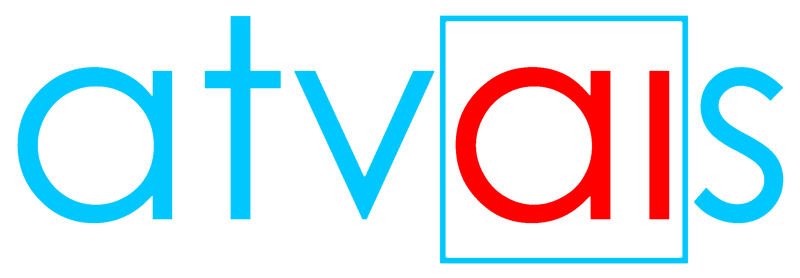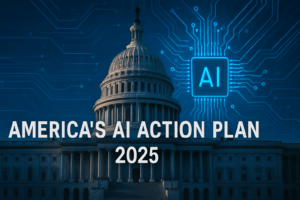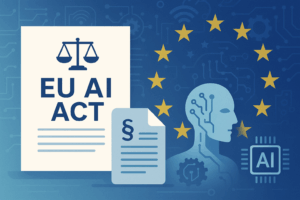Navigating the Emergence of AI: The Imperative for Responsible Governance
In an era where artificial intelligence (AI) is increasingly woven into the fabric of our daily lives, the imperative for responsible AI governance has never been more critical. This concept of governance extends beyond mere regulatory compliance; it encapsulates a holistic approach that harmonizes AI development with ethical standards, societal well-being, and legal frameworks. As we stand at the crossroads of technological advancement and ethical considerations, the global momentum for AI governance initiatives is rapidly gaining traction.
Notable examples, such as the European Union’s AI Act and President Biden’s Executive Order on Promoting Responsible Development of Artificial Intelligence, signal a transformative shift in the landscape of AI. These pioneering efforts are not just bureaucratic exercises; they represent a collective acknowledgement of AI’s profound impact on society. They aim to steer the development and application of AI towards a path that maximizes its potential to benefit humanity while diligently mitigating the risks associated with its deployment.
The Global Landscape of AI Governance
The landscape of AI governance is as diverse as it is complex. Different nations and regions are approaching the challenge with varying degrees of urgency and methodology. In Europe, the EU AI Act is setting a precedent with its comprehensive, risk-based regulatory framework. Across the Atlantic, the United States is taking strides under the guidance of President Biden’s Executive Order, which emphasizes a collaborative approach to developing AI responsibly. These initiatives are not just isolated policies; they are part of a global dialogue on how we, as a global community, envision the future of AI.
Balancing Ethical Values and Mitigating Risks: The Intersection of Principles and Challenges in AI Governance
The Core Principles of Responsible AI Governance
At the heart of responsible AI governance lie core principles that serve as the ethical backbone of AI development and deployment. These principles include fairness, ensuring that AI systems do not exacerbate existing societal biases; accountability, where developers and users of AI are responsible for the outcomes of these systems; transparency, allowing stakeholders to understand how AI systems make decisions; and explainability, ensuring that these processes are accessible and understandable to the general public.
But perhaps the most critical principle is that of human oversight. This principle mandates that despite the autonomy of AI systems, ultimate control should rest in human hands, enabling intervention when necessary. These principles are not just theoretical concepts; they are practical guidelines that shape the way AI is created and used, ensuring that it aligns with the broader goals of societal benefit and ethical integrity.
Addressing the Challenges and Risks
While the principles of AI governance aim to establish a robust ethical framework, they also address the myriad risks that AI poses. One of the most pressing concerns is the issue of bias. AI systems, by their nature, learn from data, which can often reflect existing societal prejudices. This learning process can inadvertently perpetuate and even amplify these biases if not carefully managed.
Discrimination, closely linked to bias, is another significant risk. AI systems, particularly those involved in decision-making processes, can discriminate against individuals or groups, often based on protected characteristics like race, gender, or religion. This discrimination can have far-reaching consequences, affecting everything from job opportunities to access to essential services.
Privacy breaches represent another crucial challenge. AI’s ability to collect, analyze, and store vast amounts of personal data raises significant concerns about privacy and data protection. The risk is not just theoretical; there have been numerous instances where AI systems have compromised personal data, leading to significant privacy violations.
Lastly, the issue of job displacement is a growing concern. As AI systems become more capable, particularly in automating tasks traditionally performed by humans, the potential for job displacement increases. This displacement raises complex questions about the economic and social equity implications of AI, particularly in sectors most vulnerable to automation.
Harmonizing Global AI Policies: The EU AI Act and President Biden’s Executive Order
In an effort to address these challenges, global policies like the EU AI Act and President Biden’s Executive Order have emerged as frontrunners in the quest for responsible AI governance.
The EU AI Act: Pioneering a Risk-Based Approach
The EU AI Act is a landmark piece of legislation in the realm of AI governance. It categorizes AI systems into four risk levels: unacceptable, high, moderate, and low. This risk-based approach allows for a more nuanced regulatory framework, ensuring that higher-risk AI applications face more stringent scrutiny. The Act places significant emphasis on aspects such as transparency, explainability, human oversight, and compliance with data protection regulations, especially for high-risk AI systems.
This legislation is not just about imposing regulations; it’s about creating an environment where AI can thrive responsibly. By setting clear guidelines and standards, the EU AI Act aims to foster an ecosystem where innovation and ethical considerations go hand in hand.
President Biden’s Executive Order: A Focus on Equity and Collaboration
Meanwhile, in the United States, President Biden’s Executive Order on AI takes a slightly different approach. The Order underscores the importance of promoting equity, fairness, and non-discrimination in the development and use of AI. It recognizes the transformative power of AI while acknowledging the potential risks it poses, particularly in terms of social and economic disparities.
The Executive Order calls for a collaborative effort among government agencies, industry, academia, and civil society. This inclusive approach is vital in establishing clear guidelines and standards for responsible AI development and deployment. It’s about building a consensus on how AI should evolve, ensuring that it serves the broader interests of society.
The Emerging Landscape of AI Governance Careers: Skills, Opportunities, and Growth
The burgeoning field of AI governance is not just about policies and regulations; it’s also about the people who will lead this charge. As AI continues to reshape our world, the demand for skilled professionals in AI governance is growing exponentially. This new era of career growth offers a diverse range of opportunities, from policy development and regulatory compliance to technical expertise, stakeholder engagement, and research.
Essential Skills and Qualifications for AI Governance Professionals
Succeeding in the field of AI governance requires a unique blend of skills and qualifications. A deep understanding of legal frameworks is essential, as is a technical grasp of how AI systems operate. But perhaps most importantly, a strong ethical compass is crucial. Professionals in this field must navigate complex ethical dilemmas, balancing the potential benefits of AI with its risks.
The Diversity of Career Paths in AI Governance
Career paths in AI governance are as varied as the field itself. Opportunities abound in policy development, where professionals shape the legislative landscape that governs AI. Regulatory compliance roles are also critical, ensuring that AI applications adhere to established standards and guidelines.
Technical roles are equally important, with a growing need for experts who can assess and manage the risks associated with AI systems. And with the increasing importance of stakeholder engagement, roles focusing on building consensus and fostering collaboration between different sectors are becoming more prominent.
Envisioning the Future: Responsible AI Governance as a Cornerstone for Sustainable AI
As we look towards the future, the role of responsible AI governance in shaping a sustainable and equitable world cannot be overstated. It’s about harnessing the transformative power of AI while ensuring that it aligns with our ethical values and societal goals. By embracing responsible AI governance, we can unlock the full potential of AI, using it as a force for good to build a more sustainable and equitable future.
In conclusion, responsible AI governance is not just a regulatory requirement; it’s a fundamental aspect of how we, as a society, approach the development and use of AI. It’s about creating a future where AI benefits all, a future where innovation and ethics go hand in hand. As we continue to navigate the complexities of AI, responsible governance will remain a guiding light, ensuring that AI serves the best interests of humanity.
Frequently Asked Questions
- What are the key principles of responsible AI governance?
Key principles include fairness, accountability, transparency, explainability, and human oversight. - What risks does AI governance address?
It addresses biases, discrimination, privacy breaches, and job displacement concerns. - How does the EU AI Act categorize AI systems?
The EU AI Act categorizes AI systems into four risk levels: unacceptable, high, moderate, and low. - What is the focus of President Biden’s Executive Order on AI?
It focuses on equity, fairness, non-discrimination, and stakeholder engagement in AI. - What career opportunities are emerging in AI governance?
Opportunities include policy development, regulatory compliance, technical expertise, and ethical AI research.






